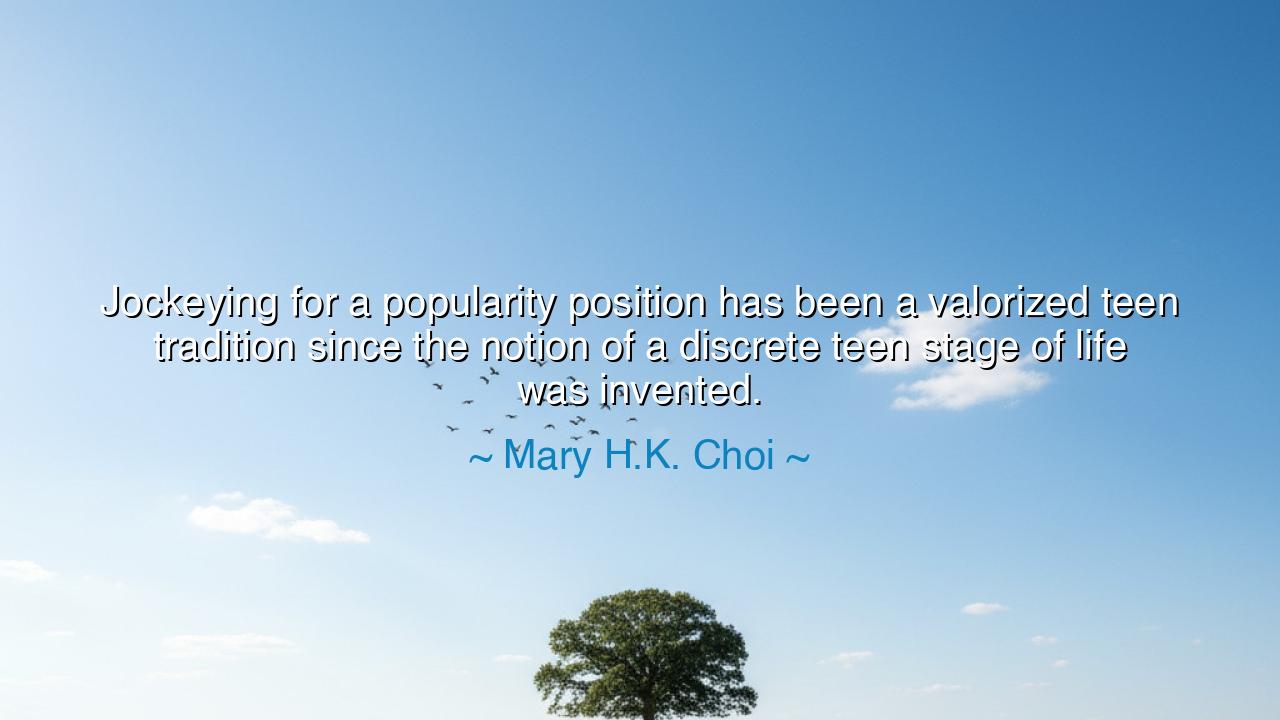
Jockeying for a popularity position has been a valorized teen
Jockeying for a popularity position has been a valorized teen tradition since the notion of a discrete teen stage of life was invented.






When Mary H.K. Choi proclaimed, “Jockeying for a popularity position has been a valorized teen tradition since the notion of a discrete teen stage of life was invented,” she revealed the timeless struggle of youth to be seen, to belong, to ascend in the invisible hierarchy of their peers. Her words are sharp with irony, but also tender with truth, for what she names is not merely a modern phenomenon, but an ancient hunger: the desire for recognition. The teen years, that fragile bridge between childhood and adulthood, have always been marked by the question—where do I stand among others?
The origin of this struggle lies not in the individual but in society’s creation of “the teenager” as its own stage of life. Only in the last century did the concept of a teen stage emerge, when industrialization and schooling created a liminal period where the young were no longer children, yet not fully adults. Into this gap poured music, fashion, film, and the rituals of high school, each one a mirror reflecting back the values of belonging and exclusion. Within this crucible, popularity became the crown sought after, a token of power that promised security, admiration, and identity.
Yet this battle for popularity is older than its modern mask. In ancient Athens, young men competed fiercely for honor in the gymnasium, their reputations forged not only by strength but by their circle of friends and rivals. In the courts of medieval Europe, noble youths vied for favor through wit, charm, and appearance. The setting has changed—the locker room and cafeteria replacing the coliseum and banquet hall—but the human impulse is the same: to carve a place in the eyes of others, to be remembered rather than forgotten.
Choi’s choice of the word valorized is telling, for it reminds us that this struggle is not just tolerated but celebrated. Films, novels, and television have long glamorized the “popular crowd,” elevating them to icons while casting others as outsiders. From Grease to Mean Girls, from Beverly Hills, 90210 to the endless teen dramas of today, the story repeats: social standing as destiny. And so teenagers, learning who they are, are taught to measure themselves against the fickle currency of attention and status.
But the deeper meaning of Choi’s words lies in the futility of this striving. For popularity is fleeting, a crown made of paper that burns quickly in the fire of time. Many who reigned as kings and queens of their high school years find themselves forgotten in the wider world, while those once overlooked discover their voices, their strength, and their enduring influence. The tradition may be ancient, but its promise is hollow: recognition by the crowd does not equal recognition of the self.
The lesson here is eternal: do not confuse visibility with value. The adoration of peers may dazzle for a moment, but it does not define your worth. True strength lies not in climbing the social ladder, but in knowing who you are when the crowd’s applause fades. If you must strive, strive not for popularity, but for authenticity, for the courage to live by your values even when they do not win you favor.
Practical wisdom follows. If you are young, resist the trap of chasing approval at all costs. Seek friends who see your true self, not just your image. If you are older, guide the next generation to value kindness, wisdom, and creativity above shallow measures of social standing. And if you find yourself still haunted by the ghosts of high school hierarchies, remember: those crowns were never real, and your worth was never theirs to give or take away.
Thus, Mary H.K. Choi’s words stand as both mirror and warning. The tradition of jockeying for popularity is old, yes, and valorized by culture, but it need not rule the hearts of those who know better. Pass this wisdom on: that the teen stage is not meant for chasing illusions, but for discovering the truth of who you are. For in that truth lies a power far greater than any fleeting crown—the power to live fully, unshaken by the tides of approval, anchored in the strength of your own becoming.






AAdministratorAdministrator
Welcome, honored guests. Please leave a comment, we will respond soon